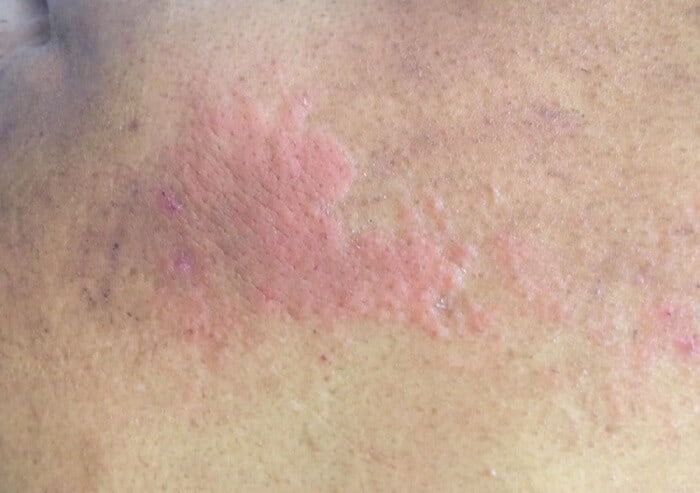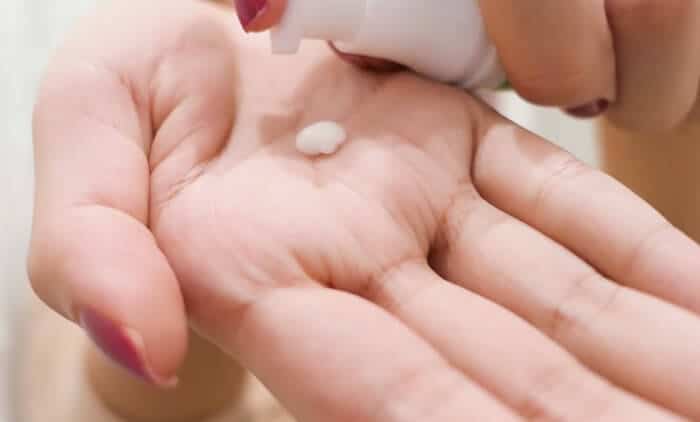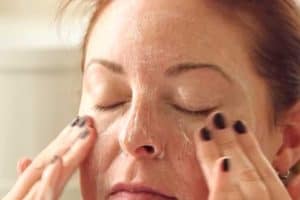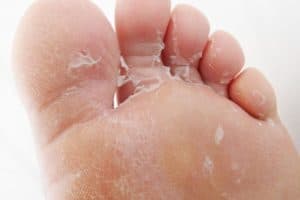Hives, otherwise known as urticaria, are red, itchy welts that can appear anywhere on the body. These are usually a result of an allergic reaction to a specific food or drug. And they resolve quickly as well.
In this article, I want to focus on a common issue: getting hives at night that are then gone in the morning.
The possible causes for hives are:
- Exposure to cold or heat
- Alcoholic drinks
- Intense emotions
- Exercise
- Exposure to outdoor elements
- Underlying illness
Read on to learn more about hives at night and how you can treat this issue.
Also, for an excellent product to prevent hives, take a look at our top pick, the Lift Lab’s Lift + Fix Calm and Eliminate Redness/Inflammation Serum:
Click here to see it on Amazon.
Diagnosing Hives at Night, Gone in the Morning

The thing about hives at night is it can interrupt your sleep, which could impact a lot of things in your life like work, school, etc. If you’ve been having hives at night, which are then gone in the morning for several weeks now, you could see a doctor about it. Your doctor will want to know the following:
- When you have hives
- Where the hives appear
- How long the hives last
- Any possible triggers you can think of
- If you’re experiencing other symptoms
If there seems to be no cause, you will more likely be diagnosed with chronic idiopathic urticaria (CIU). Don’t worry, it’s not contagious, and it isn’t dangerous either.
Some people have CIU for a few years, but some people have them for a longer period of time. While there is no known cure, changes in your lifestyle and avoiding triggers do help.
Here is a closer look at what triggers hives:
1. Exposure to Cold and Heat
Cold urticaria is the kind of hives people get when hives appear after being exposed to cold temperatures. The reaction can vary from fairly mild to very severe, and this kind of hives usually affects young adults.
Some people with this condition should consult their doctor so that they can work out a plan on what medicines to take and how to avoid cold air and water. Some of the symptoms people with cold urticaria may experience include:
- The appearance of hives on the area exposed to the cold.
- Swelling of hands when it comes into contact with the cold object.
- Swelling of the lips when coming into contact with a cold drink or food.
More severe reactions include the swelling of the tongue and throat, which makes it hard to breathe, as well as fainting and shock.
Cholinergic urticaria is when you get red, itchy hives on your skin when exposed to hot weather or anything that’s hot. Some of the causes of this kind of hives happen when you:
- Take a hot shower
- Are in a place with hot climate
- Are nervous and become sweaty
- Experience anything that causes your body temperature to go up
People who have asthma, eczema, or other allergies are more likely to have cholinergic urticaria than others, although this is a condition both men and women can have.
2. Alcoholic Drinks
If you experience “hives at night, gone in the morning,” especially after a night out with friends where you had a few drinks, an allergy test may be needed to determine if alcohol is the culprit.
There might be an allergic reaction to the ingredients in alcohol like wheat, barley, and yeast and only find out when they consume alcohol.
People who experience hives when drinking may have to restrict or even completely remove alcohol entirely. Alcohol could cause other skin conditions to worsen, so if it is causing you to break out in hives, you should avoid it as much as possible.
To help prevent hives from appearing each night or day, try Lift Lab’s Lift + Fix Calm and Eliminate Redness/Inflammation Serum.
Click here to see it on Amazon.
This serum calms, eliminates, and prevents inflammation, whether from hives, acne, eczema, or other forms of skin inflammation. It has an advanced formula containing Abyssine 657, and NAB Arnica Extract to get rid of and prevent redness and irritation.
3. Intense Emotions
Intense emotions can cause hives to break out. This is somewhat similar to cholinergic urticaria because the hives appear whenever the body’s temperature is elevated.
Stress and other intense emotions, like a temper tantrum for children, can cause hives to appear and break out on the skin.
A great primer that prevents hives and other inflammation is the Colorescience Skin Calming Face SPF 20 Primer.
Click here to see it on Amazon.
This primer helps neutralize redness and soothe irritation. Apply during the day instead of a normal primer, and your face will be calm by night, with less likelihood of hives sprouting up.
People who have hives that are triggered by intense emotions would benefit from practicing yoga as well as breathing exercises to help them calm down. Yoga helps people feel connected to their bodies, and meditation does induce a general sense of calmness.
4. Exercise
Exercise is thought of as a healthy activity, but it can also cause hives. When you work out, observe if you experience any of the following:
- Itching and redness of your skin
- Difficulty breathing
- Headaches
- Stomach cramps
- Large or small hives
If you get these symptoms when you exercise, you should stop immediately. The hives and the accompanying sensations usually disappear within a few minutes, but if it does not, and you experience any other symptoms, you should call your doctor.
Hives during exercise does not mean you should give up working out completely, but it will help if you have a workout partner who knows your condition and also knows what to do in case you do break out in hives.
Your doctor can also give you medicine and advise you on what you should do in the future.
5. Exposure to Outdoor Elements
There is a rare allergy called solar urticaria, where the affected person is allergic to sunlight, and it can cause hives to form once exposed to sunlight. People may also experience the following symptoms:
- Headache and nausea
- Low blood pressure
- Difficulty breathing
Although rare, there are some conditions that can trigger solar urticaria, such as:
- A family history of solar urticaria
- The habitual use of dyes, disinfectants, perfumes, or other chemicals
- The use of antibiotics or other medications that can trigger hives
- Dermatitis
Aside from sunlight, hives can also be caused by exposure to allergens like pollen, the hot climate, bee stings, insect bites, or even when you get into contact with outdoor plants you have an allergic reaction to.
6. Underlying Illness
Chronic hives is a condition where you have hives for more than six weeks and reoccur regularly. This condition can affect daily life and sleep. If you suffer from chronic hives, it’s best to see your doctor as this can be a sign of an underlying illness like thyroid disorders.
Chronic hives can be a symptom of thyroid disease, but it does not affect everyone who has thyroid disease. Having chronic hives is not a concrete indicator of thyroid disease as well.
However, it can be one of the early signs of thyroid disease, and having a thyroid hormone level test should help clear your worries.
Treating Hives at Home

If you suffer from hives at night that are gone in the morning, there are several ways you can help alleviate the symptoms from home. You can try the following tips:
- Put a cold compress on the hives
- Wear loose-fitting clothes
- Use an air purifier
You can also try a product with anti-inflammatory properties while providing hydration, like the Malin + Goetz Vitamin E Face Moisturizer:
Click here to see it on Amazon.
This Malin + Goetz Moisturizer is one of my absolute favorites as it is packed with helpful ingredients such as Vitamins E, B5, absorbent fatty acids, and soothing chamomile to hydrate and reduce inflammation, including hives.
Taking an oatmeal and baking soda bath can also help soothe your skin and reduce irritation, as well as adding witch hazel. Applying aloe vera to the affected areas can also soothe and help reduce hives.
If your doctor has pinpointed what causes your hives – be it a perfume, certain soaps or moisturizers, or even the sun – then do your best to avoid what triggers your breakouts.
When to See a Doctor
Some people have very few hives, while others experience it all over their bodies. Depending on the severity, you should see a doctor if:
- Your hives and its symptoms last for more than a few days
- Your symptoms get worse and do not seem to get better
- The symptoms you experience interfere with your daily life, like sleep and work
- Your rashes are painful and leave bruises
- Whenever your breathing becomes difficult
- You experience tightness in the chest
Your doctor will examine you and your rashes and may conduct blood tests as well as allergy tests to help rule out possible causes.
Conclusion – Hives at Night, Gone in the Morning
Hives, also known as urticaria, are unsightly and itchy red welts that can appear anywhere on the body.
Hives usually appear as a result of an allergic reaction to a food or drug and also usually resolves itself quickly. But what about people who experience hives at night that are then gone in the morning?
The reason behind hives hasn’t exactly been pinpointed by medical professionals yet. However, the most likely causes include the following:
- Exposure to cold or heat
- Alcoholic drinks
- Intense emotions
- Exercise
- Exposure to outdoor elements
- Underlying illness
Even though hives seem to be harmless, it can cause extreme discomfort and affect your daily life. Some people also experience severe hives, which can be life-threatening. See your doctor if your hives persist for a few days or if the symptoms do not seem to go away.







